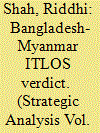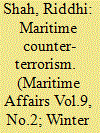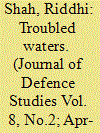| Srl | Item |
| 1 |
ID:
118138


|
|
|
|
|
| Publication |
2013.
|
| Summary/Abstract |
The International Tribunal for the Law of the Sea (ITLOS) is a body set up under the United Nations Convention on the Law of the Sea (UNCLOS) to deal with disputes that emerge because of a difference in the interpretation and application of the convention. 1 Bangladesh has had an ongoing maritime boundary dispute with India and Myanmar since 1974. On 14 March 2012, the ITLOS delivered a verdict and ended the long-running maritime boundary dispute between Bangladesh and Myanmar.
In the current global world, energy resources are a crucial element for a nation's growth. India, Bangladesh and Myanmar are no different in this regard. India discovered 100 trillion cubic feet (tcf) of gas reserve in the Bay of Bengal (BoB) in 2005-2006. Soon after, Myanmar discovered seven tcf of gas reserves near the Rakhine coast. This discovery of colossal gas reserves sparked a claim-staking contest between the three countries in the BoB.
|
|
|
|
|
|
|
|
|
|
|
|
|
|
|
|
| 2 |
ID:
126687


|
|
|
|
|
| Publication |
2013.
|
| Summary/Abstract |
Centre-state relations in India are a fascinating area of studies. The structure of the relationship has an effect on every single aspect of life as we know it in India. This paper is an attempt to study centre-state relations in the context of India's maritime counter-terrorism strategy. Although the Government of India has not publicly stated its counter-terrorism strategy on the sea, intelligence, information sharing, crisis response, finances for internal security and the nation's legislation for battling terrorism together comprise India's maritime-terrorism strategy. Through study of these areas, the paper argues that the centre-state divide has had systemic implications on India's maritime security and has largely done more harm than good to collective initiatives that aspire to prevent future risk of terrorism from the sea or on the sea.
|
|
|
|
|
|
|
|
|
|
|
|
|
|
|
|
| 3 |
ID:
132137


|
|
|
|
|
| Publication |
2014.
|
| Summary/Abstract |
The return of piracy to the Indian Ocean in modern times has culminated in the resurgence of the private violence industry in the maritime domain. For the first time in modern history, the private military security industry will work alongside traditional navies on the field. The dynamics between the two major security actors in the anti-piracy operations make for an interesting study. This article argues that there exists much potential for fruitful engagement between the two actors: PMSCs and navies. At the moment, however, long-held prejudices, in conjunction with ambiguity in the role of PMSCs in the anti-piracy operations and lack of structural variables, presents a formidable barrier to future PMSCNavy interaction.
|
|
|
|
|
|
|
|
|
|
|
|
|
|
|
|